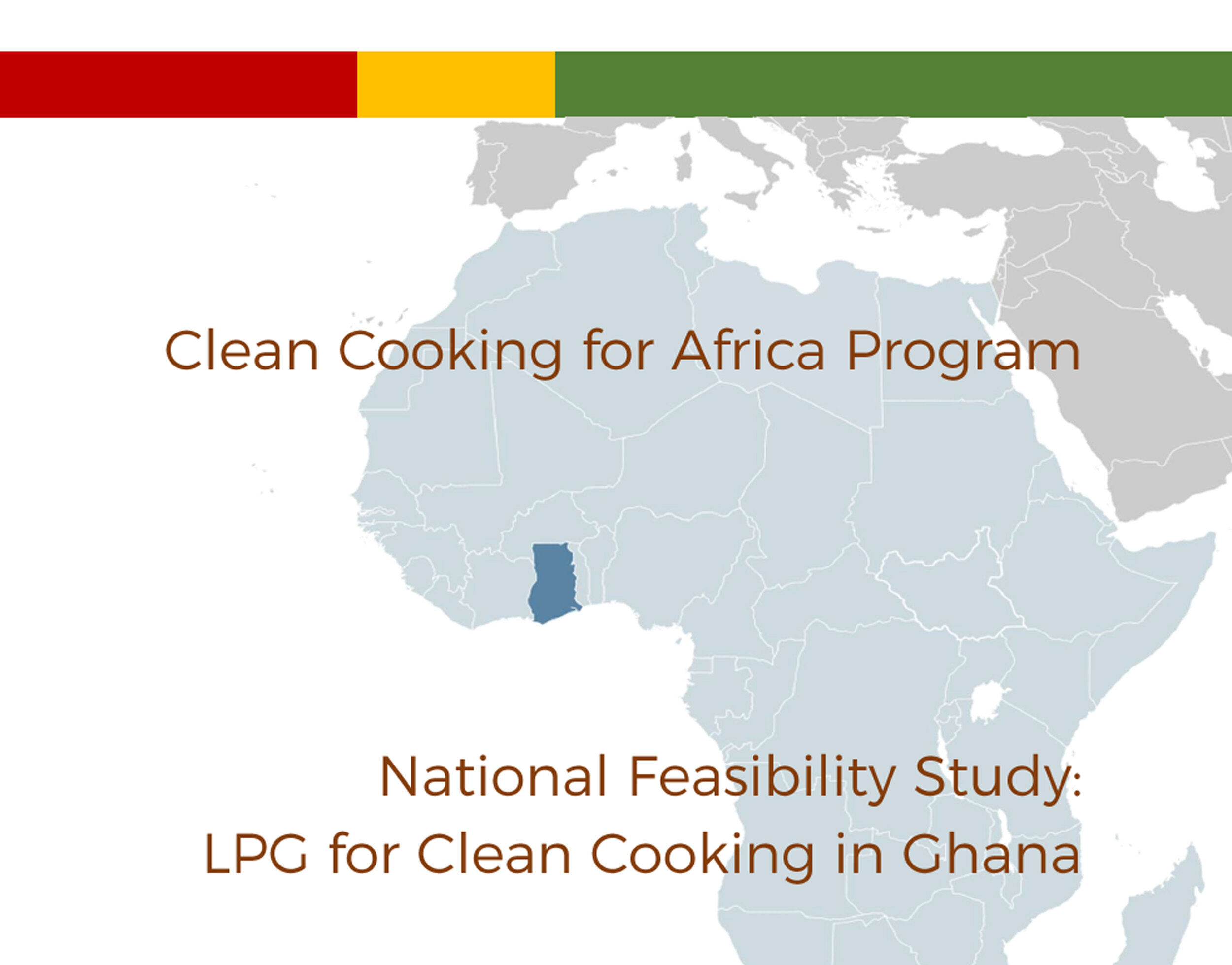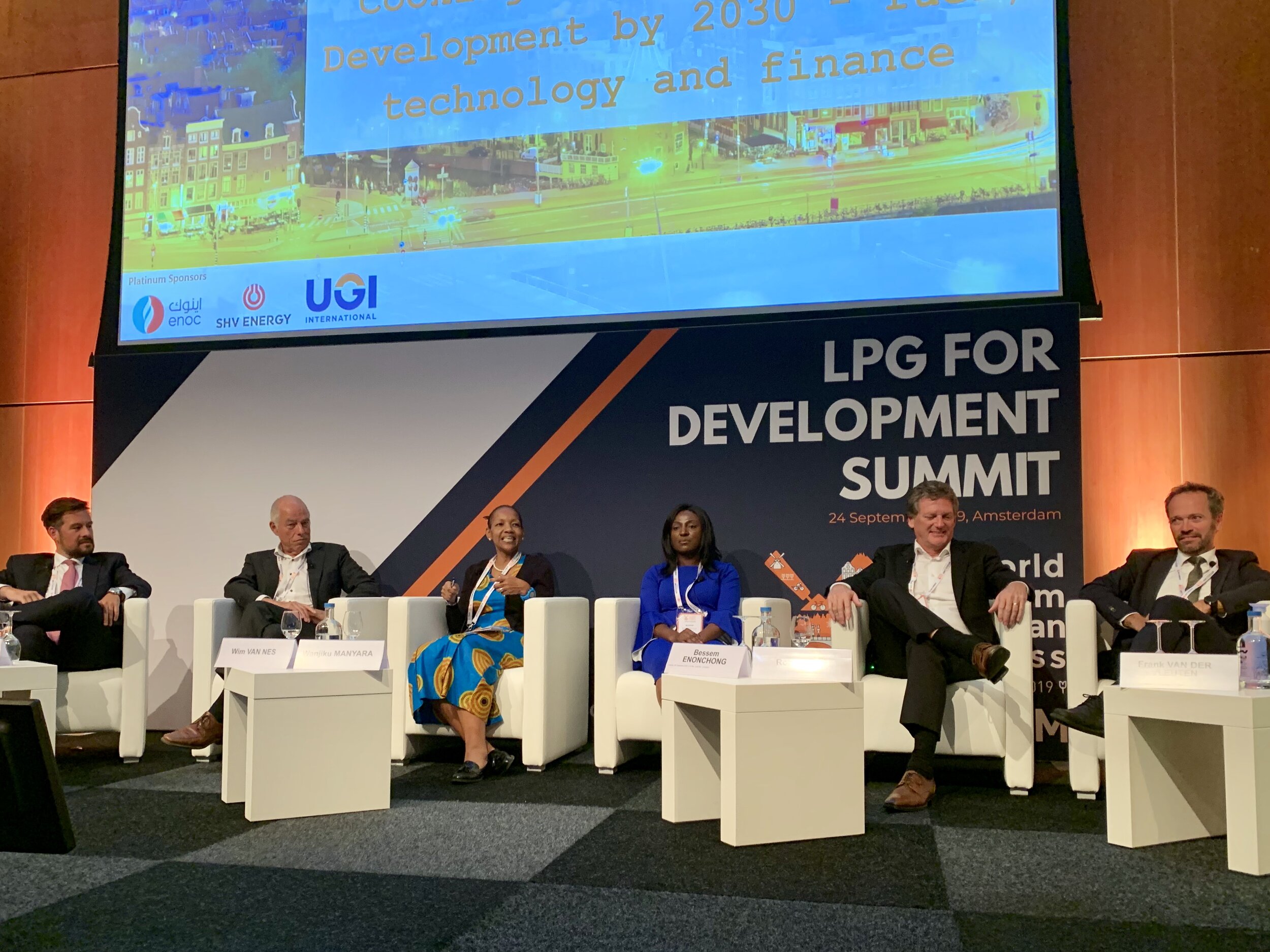GLPGP January 2020 Newsletter
Message from Alex Evans, Chair, Operating Committee
Dear Friends,
LPG is going mainstream for development, environment, and health.
2019 was a breakout year for LPG as a development and clean cooking solution, and 2020 will build on this—including important progress on renewable bio-LPG. The number of countries seeking major LPG scale-up to combat massive deforestation and the severe health consequences from cooking with charcoal and other biomass nearly doubled. Major development institutions have responded by focusing on LPG as a key solution for the first time. The latest IEA World Energy Outlook numbers project LPG (including bio-LPG) as the main clean cooking solution for over a billion people by 2030. And GLPGP has been moving the needle. Please read on for details.
We also take this moment to thank our many 2019 donors who make our work possible, including especially the European Union, KfW, the African Development Bank, the OPEC Fund for International Development, Emory University/Household Air Pollution Intervention Network, the London School of Economics, Friedrich Scharr KG and Cavagna Group S.p.a.
Please read on, and follow us on Twitter @globallpg.
Major new African country-level LPG sector and investment reports highlight growth, investment and impact potential
In November 2019, GLPGP released five major new, comprehensive reports as part of its “Clean Cooking for Africa” program — supported by a grant from the European Union Africa Infrastructure Trust Fund and administered by German development bank KfW — in three African countries to assess the potential, impacts and bankability of transition to LPG for nearly half their respective households by 2030 and recommend ways forward based on global best practices and local realities. The results from Cameroon, Ghana, and Kenya are clear on LPG’s transformative potential across the developing world: over 50,000 lives, 3 billion trees, and 350 million metric tonnes of carbon dioxide could be saved. All this against the positive backdrop of a concrete step to a fully climate-favorable cooking solution.
Click here for the Country Feasibility and Investment Reports page.
National-level LPG Projects Support Safety, Distributors and Women’s Entrepreneurship in Cameroon
In Cameroon, GLPGP completed two LPG projects and launched a third. A national safety audit of the LPG filling plant network and a training course for LPG distributors were completed in the fourth quarter. A third, long-term project – recruiting, training, financing and mentoring of women entrepreneurs in LPG distribution – is well underway, with more than two dozen new women-owned LPG enterprises being established and supported to date. All three projects are supported by a grant from the African Development Bank.
WOMEN’S ENTREPRENEURSHIP PROGRAM BRIEFING TO CAMEROONIAN WOMEN’S ASSOCIATIONS.
Creating an LPG Master Plan for Rwanda to Protect Environment and Forests
GLPGP TEAM WITH RWANDA GOVERNMENT OFFICIALS AND LPG INDUSTRY REPRESENTATIVES
The Government of Rwanda and GLPGP reached agreement on the details for jointly creating a national LPG Master Plan to inform policy and define investments and programs to increase LPG use in urban and peri-urban Rwanda through 2030 in order to cut by half the use of forest/biomass resources for cooking. The multistakeholder plan is expected to be completed as of Q3 2020. GLPGP’s work on the Plan is funded by a grant from the European Union’s Africa Infrastructure Trust Fund, administered by KfW, the German development bank.
Kimball Chen, GLPGP Chairman, Speaks at Ministerial Roundtable at United Nations Climate Action Summit
GLPGP Chairman Kimball Chen was invited to speak at the UN Secretary-General’s Climate Action Summit High-Level Event on Energy Transition on 23 September 2019. He summarized the evidence-based reasons why the developing world has moved LPG to priority status in their clean cooking/energy access efforts.
...and at UN Climate Action Summit Events
Mr. Chen also spoke at the Ministerial-level roundtable “Leaving No One Behind - Taking Action: Session 2: Energy Fueling People” at UN headquarters in New York on 22 September 2019, as part of the Climate Action Summit Weekend Events. The events were co-organized by the Executive Office of the UN Secretary General and different countries and institutional partners, as an opportunity to present and discuss solutions to lower the financial and social costs of transitioning to carbon neutrality.
In his remarks, Mr. Chen noted that many developing countries have made large scale LPG sector growth a priority, and both the International Energy Agency and World Health Organization have identified LPG as an important, quickly scalable solution for the 3 billion who need clean cooking. Mr. Chen also emphasized that GLPGP looks forward to collaborating with the global development system and host countries to develop LPG for clean cooking on a large scale.
New Study on the Impacts of Enhanced-Efficiency Pots for LPG Cooking Being Launched in Kenya
The University of Liverpool, UK, partnering with GLPGP and Amref International University, is launching a study regarding extra-efficient cookware for LPG cooking in Kenya.
In a randomized controlled trial, two enhanced cookware product lines will be used for several months by 150 Kenyan households that already cook regularly with LPG. The study will include gas measurements, surveys and in-depth interviews in order to assess the households’ fuel savings in comparison to cooking with conventional cookware, the users’ attitudes towards the enhanced pots and their willingness to pay for the pots in view of the fuel savings and improved cooking speed. The study funding is from the UK’s Department for International Development (DFID), through DFID’s newly-launched Modern Energy Cooking Services (MECS) program.
Accelerating Clean Fuel Uptake by the Rural Poor through Mobile Payments in Kenya
GLPGP has partnered with Sustainable Community Development Services (SCODE), a Kenyan community organization, in a pilot project to test innovative, user-friendly LPG consumer financing models to improve affordability of clean fuels and stimulate clean use among the rural poor, via mobile payments. The pilot comprises 100 households in a rural community, where there is parallel access to electric cooking. It will assess consumer perceptions of cooking with LPG and electricity, with the aim to promote stacking of truly clean fuels only. Repayment and LPG consumption rates will be tracked. The findings will inform development and deployment of a mobile payments model for accelerating LPG adoption to complement e-cooking. The project is supported by funding from the UK DFID Modern Energy Cooking Services (MECS) programme’s Technology Research for International Development (TRIID) Challenge Fund.
RECENT EVENTS
WHO HQ Conference to Operationalize its Health and Energy Platform of Action (HEPA)
GLPGP Chair Kimball Chen and other GLPGP colleagues joined leaders from WHO, UNDP, UNDESA, the World Bank, the Clean Cooking Alliance, IRENA, Energia, and others at a high-level meeting at WHO headquarters in Geneva in September 2019 to define the structure, governance and operational plan for HEPA as a major new platform for strengthening global and national political and technical cooperation across the health and energy sectors to accelerate the transition to clean energy for cooking, health care facilities, and other vital uses.
See www.who.int/news-room/detail/10-09-2019-stakeholder-meeting-on-building-the-health-and-energy-platform-of-action for a summary of the conference and links to other HEPA information.
Climate and Clean Air Coalition (CCAC) High-Level Assembly and UN Climate Action Summit
GLPGP Chair Kimball Chen joined ministers and global organizational leaders at the invitation-only CACC Summit, held in conjunction with the UN Secretary-General’s Climate Action Summit, in New York City on 22-23 September 2019. The CCAC participants finalized and adopted a 2030 Vision Statement and action program for enhanced efforts to address climate change and achieve the 1.5°C Challenge. The consensus CCAC views were presented in the Secretary-General’s Climate Action Summit.
MECS / Universtiy of Surrey Conference on Renewable Bottled Gases for African Cooking
GLPGP Chair Kimball Chen and Director of Research, Monitoring and Evaluation Dr. Elisa Puzzolo were invited speakers at this conference hosted by the University of Surrey, UK, in October 2019. They and other global clean-cooking and energy leaders from the public and private sectors and academia presented and discussed the opportunities and requirements for scaling clean cooking with biomass-derived gases, covering biogas and bio-CNG from anaerobic digestion and bio-LPG. The conference was supported by the UK DFID MECS programme.
LPG for Development Summit (LPG4DEV) Outcomes Document Is Online
GLPGP and the World LPG Association cosponsored the third annual LPG For Development Summit in Amsterdam on 24 September 2020, in connection with the World LPG Forum. The Summit brought together global LPG industry stakeholders to learn about and discuss the growing role and priority of LPG as a clean cooking solution in the developing world, focusing this year on the significant health benefits that can result from the transition to LPG and bio-LPG.
The outcomes document is now available here.
Clean Cooking Forum
GLPGP Chair Kimball Chen and Kenya Country Manager Elizabeth Muchiri presented about LPG and its role and potential as the leading clean cooking solution to 2030 (per the International Energy Agency) and discussed other clean cooking solutions on panels and in working groups with leaders of local and global organizations, at the biannual Clean Cooking Forum in Nairobi, Kenya on 5-7 November 2019, hosted by the Kenya Ministry of Energy and Clean Cooking Alliance.
GLPGP issued a public call for increased investment in and development support for LPG as an urgent, truly clean, climate neutral/beneficial, and most scalable cooking solution to 2030 and beyond.
Read GLPGP’s press release here.






